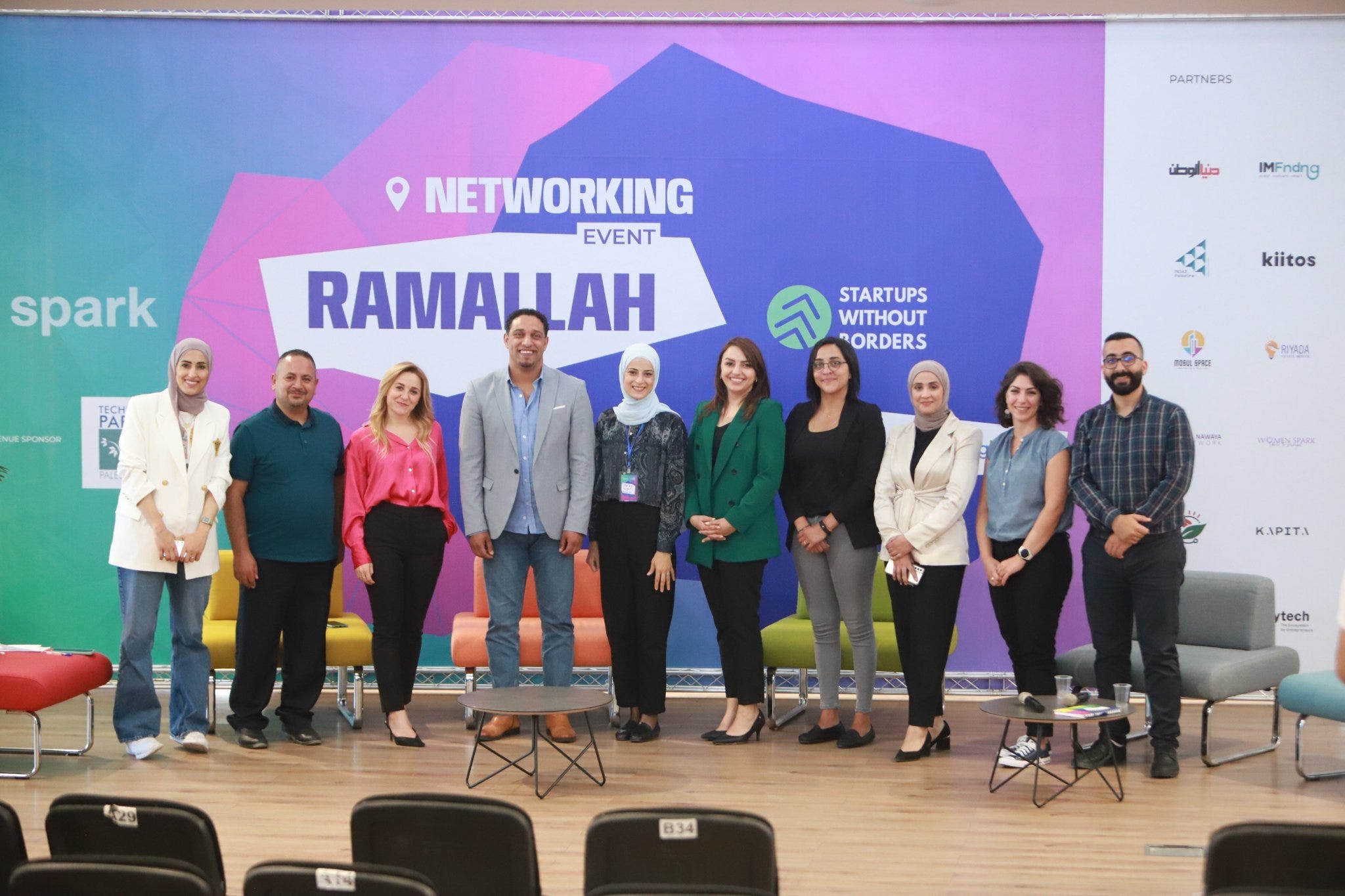What makes and breaks the Palestinian startup ecosystem
Three external variables have much to do with the past, current, and future state of the Palestinian startup scene.

A nascent ecosystem
Palestine, a country of 5 million people divided into two distinct parts (West Bank and Gaza) is home to a small yet burgeoning startup scene. The country’s population enjoys high literacy rates and a solid array of universities, providing the ecosystem with a steady stream of competent and ambitious founders.
The ecosystem is described as being in “early activation phase with growth potential”. Indeed, a select few Palestinian startups are starting to gain momentum and traction, such as Mashvisor, Gamify, Userpilot, Tawazon, and WeDeliver. Overall, interest in startups is growing amongst the population, especially students, who see the disruptive act of creating a startup as an intellectual defiance to the injustices they were born into.
The ecosystem is still nascent. There is only one active VC in Palestine (Ibtikar), which is complemented by a small but steady number of startup incubators. Palestinian startups have raised a total of $150M, not last year but in total. In short, there is a lot to build and a strong desire to do so amongst actors of the ecosystem.
This article will be focused on three variables that I believe are key to the success, failure, or stagnation of the Palestinian startup ecosystem, namely foreign aid, Israel, and the Palestinian diaspora. I am well aware that other factors such as local regulations, involvement of family offices, scarcity of talent, and the cultural taboo of failure within Palestinian society are also key components of the ecosystem. But for today, I will focus on the three aforementioned ones.

Foreign aid
Foreign aid in Palestine has been omnipresent for decades. This comes as a result of the dire economic situation endured by the large swaths of Palestinians displaced following the creation of Israel in 1948. Foreign aid has become permanently engrained in the Palestinian economy, representing up to 13% of GDP.
Today, foreign aid money plays a crucial role in maintaining key ‘public’ services such as education in Gaza for example (through UNRWA). Aid money has admittedly played a role in better infrastructure and higher rates of education within the Palestinian population. However, criticism of aid remains numerous and valid, ranging from the unsustainability of a donor-dependency model to the millions shaved off by corrupt officials from the two governing Palestinian bodies (the Palestinian Authority in the West Bank, and Hamas in Gaza). One of the most prominent criticism is how dependency on aid maintains the increasingly worsening status quo, as Israeli settlements proliferate amongst Palestinian land supposedly belonging to Palestine according to the Oslo Accords.
Aid organizations are aware of the various critics against them. A member of the ecosystem told me that many of the aid workers present on the ground had genuinely good intentions for the people they were serving. Following criticism of their current model, aid organizations in Palestine have attempted to reinvent themselves by getting heavily involved in our topic for today: the local startup ecosystem.
Supporting the local Palestinian startup ecosystem clearly does more for the economy long-term than providing financial IVs to corrupt and inefficient institutions. However, foreign aid organizations might not be the ones for the job. Indeed, aid organizations and startup founders have fundamentally different KPIs.
Founders stay lean, are bound to the ruthless law of the market, and need to expand regionally or globally. Aid organizations look for job creation, are bound to the foreign policy agenda of their funder, and often have a Palestine-centric mission. By building incubators aimed at their donors’ ‘social impact’ goals rather than frank, unapologetic business success, some incubators severely constrain a generation of ambitious founders.
“The dependence on foreign donors and, consequently, donor agendas in terms of entrepreneurial development frameworks have generated entrepreneurship and an entrepreneurial ecosystem that is unresponsive, unsustainable, inaccessible, and far removed from the Palestinian market needs; hence, most efforts are yet to produce significant economic and social impacts.” - Source
This creates a frustrating situation in Palestine, where a large majority of the available startup incubators are financed by foreign aid organizations. Founders can become prey to “grant-hoping”, collecting grants by pitching aid orgs on their “impact” without actually building and measuring up to the market. It can also be detrimental to founders to be accompanied by non-startup minded people, who even with the best intentions in the world, are bound by an agenda that isn’t compatible with a startup founder’s needs.
This doesn’t mean aid orgs should be completely absent from the ecosystem: at the end of the day, they are some of the only ones putting up money at a time when barely any local or foreign investors are taking risks on Palestinian startups. However, I believe the role of aid orgs should be purely monetary, delegating their financial resources to startup-competent people. The IFC’s investment in Ibtikar, the only Palestinian VC to date, is a step in the right direction.
Israel
The tight restrictions on the movements of goods, people, and services imposed by Israel on Palestine severely hinder the Palestinian startup ecosystem. For example, it can quickly become a logistical nightmare for a Palestinian founder to create a hardware startup, due to the endless bureaucracy required to clear all of the materials they would have to import (Israel mainly controls what goes in and out of Palestine).
In another shocking exemplification of the problem, Israel only allowed Palestine to have access to 3G in 2018. This gravely impeded the ecosystem, with some of the most ‘basic’ startups such as ride-hailing, which often serve to kickstart an ecosystem, being unable to operate.
“The telecom barriers the Israelis are putting on Palestine made severe damage to the IT sector in Palestine. We are using 3G in a very low capacity.” - Ibrahim Bahram, founder of SAFAD
The shackles imposed by Israel on the Palestinian economy make it extremely hard for Palestinian founders to raise money. Indeed, not only are the socio-economic problems they are facing critical, but the resolution to those problems also lies almost entirely out of their control. This makes foreign and local investors frisky. Israeli restrictions represent a dam blocking foreign capital from coming into the ecosystem, except no Palestinian is in the dam’s control center.
“Funding limitations typically result in founders aiming for revenue prematurely. Forced to rely on Minimal Viable Products and less competitive concepts, founders restrict their growth potential and access to further funding and growth. An overreliance on bootstrapping also disincentivizes potentially talented founders, especially those from lower socioeconomic backgrounds to take the risk of founding a company.” - IPSD report
A recent problem to arise has been the fact the recruitment of Palestinian tech talent by Israeli companies, either for their own startups or for outsourcing. In the short term, this is detrimental as Palestinian startups struggle to maintain local talent. However, it might have a positive impact long-term, if that talent decides to come back to Palestine and found startups. However, the ecosystem has to be ready to welcome them and support them when they come back.
Israel’s negative impact on the ecosystem is most evident in the Gaza Strip. The strict blockade on almost everything, including people, leads to situations whereby founders from the Gaza Strip can’t even leave the Strip to go pitch their startup abroad. The punctual bombing and destruction of Gazan infrastructure severely affects the few founders trying to make a name for themselves, both physically (offices destroyed) and mentally.
All in all, Israel’s arbitrary restrictions, increasing occupation (through settlements), and physical destruction in the case of Gaza make it very hard for Palestinian startup founders to raise, build, and grow.
Diaspora
I don’t think anyone would disagree with the massive opportunity the Palestinian diaspora represents for the Palestinian ecosystem. Connecting the Palestinian diaspora to startup founders in Palestine was the premise on which Marwan and I founded our first startup, GrowHome.
However, the debate should evolve. Yes, the diaspora represents an opportunity. The conversation now should be to determine how to best engage the diaspora, instead of continuously talking about the “opportunity” the diaspora represents. Concrete actions and steps need to be taken.
First and foremost, the goal isn’t really to engage the Palestinian diaspora. The vast majority of Palestinians in the diaspora have absolutely nothing to do with the startup world, and should thus be left out of the conversation. What really needs to be done is mapping and engaging the tens of thousands, not millions, of diaspora Palestinians who have some type of experience or interest in the startup world (founders, VCs, angel investors, tech workers, etc…).
Second, high levels of remittances should stop being used as proof that diasporas are keen to get involved in startups back home. There is a world between sending your grandma $200 and risking up to $50,000 on a Palestinian founder you don’t know. In other words - remittances should be a small part of this conversation, used simply to show that the diaspora is connected to its home country. Building a desire and the infrastructure enabling diasporas to invest in startups back home is a whole new ball-game.
Speaking from personal experience (GrowHome didn’t work as we wanted it to), engaging the diaspora to invest in startups back home is mainly a matter of branding. How do you present the opportunity to them? Do you pitch it as a philanthropic gesture? Do you pitch it as a revolutionary investment opportunity?
I think one of the mistakes we made with GrowHome was presenting our product as a “startup donation” platform, instead of making concrete business cases for the startups we were trying to serve. I believe the key to diaspora/startup engagement is to present the opportunity to invest in startups back home as a real, viable business opportunity (in most cases, it is as many Palestinian startups build in digitally virgin markets). The higher risk and apprehension associated with investing in startups in such a jurisdiction can then be “subsidized” by the diaspora’s emotional attachment to the place.
A great example of a country engaging its diaspora to develop its startup ecosystem is Pakistan. What’s telling about how they go about it is the enthusiasm and emphasis they place on presenting Pakistani startups as lucrative investment opportunities. They don’t tell diasporas to “help” Pakistan, but instead present investing in Pakistani startups as a potentially very lucrative endeavor, as these startups are solving hard problems, in digitally untapped markets, for a large number of people. While Pakistan certainly doesn’t face the same challenges Palestine does, synergies can be found in diaspora/startup engagement, especially in the way local startups are “branded” to potential diaspora investors.
Check out how Paklaunch, one of the main organizations engaging the Pakistani diaspora in the Pakistani ecosystem, presents and brands Pakistani startups.
Conclusion
When writing this article, I talked to Majd Zghyer, who is in my opinion, the best writer covering the Palestinian startup ecosystem at the moment. He pinpointed what I believe is the key to unlocking the ecosystem’s next step:
“I strongly believe that what's needed at this stage is a genuine 'success story' for a Palestine-based startup (such as exits through acquisition/merger by global players and/or listing on regional/international stock exchanges). A success story can be the ultimate differentiator with ecosystem-wide ripple effects.”
Many often tout the “resilience” of Palestinian founders. Yes, Palestinian founders are resilient, due to the continuous obstacles put in their way. But resilience is far from enough to create a healthy startup ecosystem. In order to enable Palestinian startups to thrive, money has to be invested, laws have to updated, and negative externalities have to be reduced. One can’t hide behind the “resilience” of Palestinian founders as a justification for not attempting to solve the many problems the ecosystem faces.
The Realistic Optimist’s work is provided for informational purposes only and should not be construed as legal, business, investment, or tax advice.


